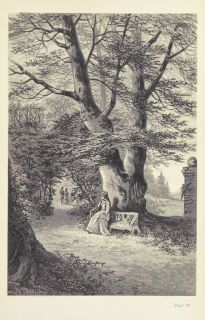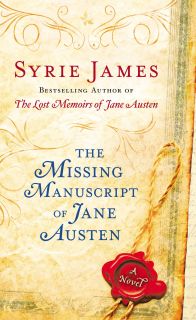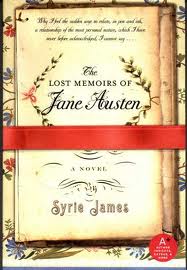|
|
Why I Love Mansfield Park
by Syrie James

For many years, I thought Mansfield Park the most ponderous of Jane Austen’s novels. Although I have read and re-read all of Austen’s other books many times over with the greatest of pleasure—Pride and Prejudice and Persuasion are on my top ten list of favorite books—for some reason, my every attempt to read Mansfield Park was a struggle. I could not get through it.
My feelings about the book changed two years ago. I was researching Jane Austen’s First Love, my new novel, inspired by a true story, about Jane Austen’s romance at age fifteen with Edward Taylor, the wealthy and charming heir to a Kent estate. (You can read more about it here.) In Jane Austen’s First Love, Jane visits the Bridges family at Goodnestone Park in Kent (Jane’s brother Edward Austen was newly engaged to his future wife, Elizabeth Bridges, at the time). The young people put on a home theatrical, just as the characters do in Mansfield Park, so to research that part, I made a point of re-reading Austen’s novel. To my amazement and delight, this time I loved the book and couldn’t put it down!
On prior readings of Mansfield Park, I had considered Fanny Price to be annoyingly weak and prim. Everything seemed to shock her or make her feel uncomfortable. Compared to such vivacious and outspoken characters as Austen’s Emma Woodhouse and Elizabeth Bennet, Fanny wasn’t any fun. Why, I used to wonder, was Fanny so against participating in something as innocent and enjoyable as play? I am a huge fan of the theater, and have acted in or been involved in many productions. Why was Fanny unable to see any good in Henry Crawford, who tried so hard in the latter part of the book to improve himself to win her hand? Why did she so emphatically turn down his proposal, even though Sir Thomas and everyone else wanted her to marry Crawford? Even Jane Austen’s sister Cassandra famously said that she wished Jane had let Fanny marry Henry, who was so much more interesting than Edmund.
Something must have changed within me since my last perusal of the novel, because upon this reading, I liked Fanny a lot. I suddenly understood and valued her for the first time.
Fanny was against the family putting on the play for a variety of reasons. First, she thought her uncle would not approve (which proved to be true), and she did not wish to offend him. Second, she admitted that she was too shy to perform and didn’t think she’d be good at it (nothing wrong with that). Third—and most important of all—once Fanny understood what the play “Lovers’ Vows” was about, and that Edmund Bertram and Mary Crawford would be obliged to perform a very intimate scene where their characters admitted their passionate feelings for each other, Fanny smelled impending danger. Fanny was in love with Edmund, and knew that scene would be difficult for her to watch. She worried that it would allow a kind of physical intimacy between the actors which would never be permitted in real life, and that in so doing, their romantic feelings expressed on stage might be mistaken for the real thing. She had the same concerns about Maria Bertram and Henry Crawford, whose scenes required a similar physical intimacy—and indeed, their behavior both on and off stage was rather scandalous, and made Maria’s fiancée Mr. Rushworth very uncomfortable.
All of Fanny’s worries and considerations turned out to be true. Fanny, I realized, was not weak or prim—quite the reverse—she was a thoughtful, proper, sensitive, and deep-feeling young woman, who only wanted to do what was right. Despite all her valid concerns about the play, however, Fanny still showed her support for the others by acting as a prompter, which I think was very nice of her.
In this recent reading of the novel, I finally understood something else as well: why Fanny was not interested in nor attracted to Henry Crawford. Henry is a charming rogue when we first meet him, and he seems to change for the better in the last part of the book. But Fanny saw Henry’s new behavior as “all beyond belief! He was inexcusable, incomprehensible! But such were his habits that he could do nothing without a mixture of evil.” She considered his romantic overtures “all as nonsense, as mere trifling and gallantry, which meant only to deceive for the hour.” As it turned out, Fanny was right; she was perceptive enough to see the real man beneath the charade. Henry didn’t really change at all. It was just an illusion, an act, a personal challenge, to see if he could win Fanny over. When he failed, he quickly succumbed to his own dark nature, and ran off with Mrs. Rushworth.
At the end of the novel, Mary Crawford claims that if only Fanny had accepted Henry “as she ought,” she “would have fixed him.” She says: “He would have taken no pains to be on terms with Mrs. Rushworth again. It would have all ended in a regular standing flirtation, in yearly meetings at Sotherton and Everingham.” Mary offers this as a totally acceptable scenario—when of course it is anything but. Jane Austen is telling us that there was no “fixing” Henry Crawford. He was a rogue who could never have been faithful to one woman. Fanny didn’t, and couldn’t, accept Henry Crawford’s proposal because she did not love or respect him, and knew he did not feel that way about her. It is the founding principle of every Austen novel: marriage can only be happy when both people love and respect each other.
Fanny adored Edmund from the day they first met. Even though it takes Edmund the length of the novel to discover his true feelings for her, I don’t think it makes them any less valid. Fanny and Edmund may not make the most exciting couple in the world, but they are their own perfect match—and that is all that really matters.
I admire Fanny now. I see that she is not a weak person at all; she is incredibly strong. She stuck to her principles, no matter how hard people tried to persuade her otherwise. She was always true to herself. She knew who she was and what she wanted, and she would settle for nothing less.
As Fanny tells Mr. Crawford: “We have all a better guide in ourselves, if we would attend to it, than any other person can be.” That is the lesson I take away from Mansfield Park: that to be happy, we must each follow the guide within us. We must be true to ourselves. Thank you, Jane Austen, for that very important reminder.

All rights reserved by Syrie James
SYRIE JAMES is the bestselling author of eight critically acclaimed novels including The Missing Manuscript of Jane Austen, The Lost Memoirs of Jane Austen, The Secret Diaries of Charlotte Brontë, Dracula My Love, Forbidden, Nocturne, Songbird, and Propositions. Her next novel, Jane Austen’s First Love, is due out from Berkeley on August 5, 2014. Follow Syrie on twitter, visit her on facebook, and learn more about her and her books at syriejames.com.
  
© Jane Austen Society NL. De teksten op deze website mogen niet doorgeplaatst worden zonder toestemming. Citeren mag alleen met bronvermelding. Neem contact op voor meer informatie via info@janeaustensociety.nl© Jane Austen Society NL. It's prohibited to use the content of this website without permission. Quoting only with acknowledgement of source. Please contact info@janeaustensociety.nl for more information. |